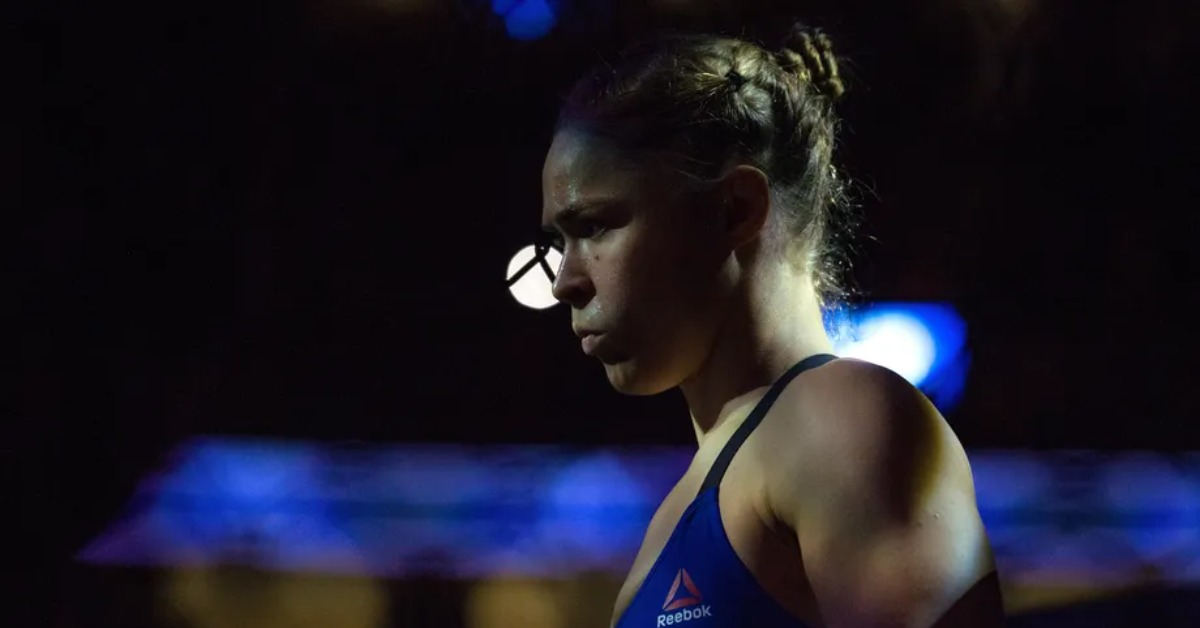Review – An Honest Ronda Rousey Pulls No Punches In New Memoir

01/05/2024 00:57
Ronda Rousey might not be a unanimous fan favorite. Some take issue with comments she has made in the past, like calling herself the greatest fighter ever, and others are definitely critics of her 14-fight MMA career, where back-to-back losses against Holly Holm and Amanda Nunes took her out of the sport for good.
But there's no doubt that when discussing fighters who shaped the modern years in MMA, you can't go far into that conversation without mentioning "Rowdy." Because of this, Rousey's story is perfect for a memoir.
‘Our Fight’ Provides Honest Perspective Of Rousey’s Champion Years
Rousey's latest book, "Our Fight: A Memoir," is different from her prior published title due to its timing. Unlike her prior release, Rousey is now past her years as a fighter and wrestler, giving her stories a start and ultimate end. But a good story isn't always told right. This begs the question: Does Rousey provide a good recounting of details in her April release?
Memoirs can bend the truth. They can allow figures to provide a retelling of the past through rose-colored glasses. It can give a public figure the chance to tell you that things didn't actually go as poorly as you might have thought they did, or that unfortunate events that hit them were actually someone else’s fault. Ronda Rousey's book doesn't attempt to do any of this.
In "Our Fight," readers are brought into the unfiltered mindset of one of MMA's most influential names. Rousey isn't afraid to discuss failure or low points in her career. In fact, it felt like Rousey sped past the glory of her MMA popularity and instead allowed more time to explain struggles in her career. And Ronda Rousey certainly doesn't sugar-coat her feelings about anyone or anything she has experienced.
Is it because the former bantamweight champ is simply a tell-it-like-it-is figure? Or because she seems at peace with leaving MMA and professional wrestling behind her, leaving no incentive to avoid publicly burning bridges? Either way, there's a sincerity to hearing her perspective that makes it seem like she is neither trying to protect her image nor exaggerate life experiences.
Rousey comes off as an intense character, one that isn't uncommon to find in athletes. When she feels a way about someone, it's a strong feeling. Once you're done reading this book you will know who she hates (Vince McMahon, WWE producer Bruce Pritchard, and former rival Miesha Tate to name a few) and you will be fully aware of the close circle that she trusts (The Four Horsewomen, husband and former UFC fighter Travis Browne).
It's that same intensity that comes back to bite her at times. When she lost her bantamweight title to Holly Holm, she remembers it completely derailing her life. Everything revolved around being the best, and when she suddenly wasn't, she was lost. She also reflects on how the sacrifices she made throughout her combat career meant that she was not having experiences in life as much as she hoped.
Both of those anecdotes—telling the stories of sacrifice and loss—are something that you can hear about from likely any fighter. But hearing it from Ronda Rousey, where there was heightened attention in the mainstream, is incredibly intriguing. Her work ethic set herself apart from others and made her a trailblazer in an industry, but it came at a cost.
The Cost Of Being A Fighter
Looking at her career in retrospect, Ronda Rousey was able to provide stellar insight into the life of a fighter and the negative impacts it had on her. Arguably one of the strongest chapters in the story sees Ronda Rousey revisit times in the past when judo and MMA trainers pushed her hard possibly too hard. She recounted these training sessions but looked at it through a different lens: When does tough, hard training cross the line into abuse?
She's also open about how head trauma severely affected her career and could come back to haunt her. It's often referenced in the book how prior concussions and damage to the head meant that, by the start of her MMA career, she could hardly even take a punch. Training sessions would end with her seeing "camera flashes" when she closed her eyes, a common symptom of head trauma.
Years after the wear and tear that she took from her combat sports career, she started to worry about long-term symptoms that might haunt her in the years to come. Did she not remember much of her time travelling the world for work because she was focused on the task at hand, or because her memory was already fading significantly? She's not entirely confident about what the answer is.
There's also a respectable bluntness when discussing the self-inflicted pains that Ronda Rousey went through in her career. While she lived in a pressure-cooker setting that certainly didn't have safeguards in place from pushing herself beyond her limits—something which arguably deserves some blame as well—both her MMA and wrestling careers ended because she had burnt herself out mentally and physically.
The competitive edge that was constantly pushing her was at times working at a much more aggressive pace than what she was able to realistically endure. A recurring example of this was Ronda Rousey's vow to UFC promoter Dana White that she would be available anytime, anyplace for them. Upholding this promise even when she became one of the promotion's top stars meant that she ended up competing in eight title fights over the course of four years. This level of activity, which is nearly unmatched, eventually pushed her out of the sport.
The Verdict: Is Ronda Rousey’s Book Worth Reading?
While Ronda Rousey's stories are captivating and interesting—likely elevated by her sister Maria Burns-Ortiz, a journalist who helped co-author the book—it's important to remember that you're simply hearing one perspective. There are parts of the book that you might disagree with, like certain grudges or feelings. Among the more questionable moments is Rousey seemingly still harbouring hard feelings for rival Miesha Tate, whom she last fought more than a decade ago. But the honest feelings that Rousey holds toward everyone mentioned in the book make the stories feel like a genuine reflection of her thoughts.
This book might not appeal to you if you only want to hear about one facet of Ronda Rousey's life. If you're only interested in Rousey's MMA career, the first half of the book will provide juicy details that will keep you hooked. But, if along with that MMA fandom comes a disinterest in professional wrestling, the lengthy inside baseball talk about her time in WWE might lose you. Rousey goes in-depth with each topic, meaning a passion or interest in the entertainment genres will enhance your experience when reading about the stories. If Ronda Rousey's life is a story you want to hear, from Judo to Wrestlemania, this couldn't be a better book for you.
Whether you like or dislike Ronda Rousey, her impact on MMA cannot be denied. Because of that, experiencing all of her big moments in the UFC cage from her seemingly genuine perspective makes this a worthwhile book. Clocking in at just under 300 pages, this book won't consume too much time if you're an avid reader. When considering all of these factors, it's hard to not recommend the book to someone who wants to hear beyond-the-mat info about MMA and inside the ropes details from her WWE career.


